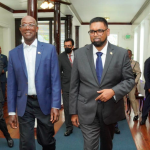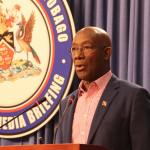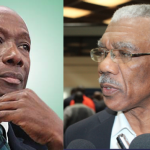
by Svetlana Marshall
With many Caribbean countries depending heavily on imported fuel, Prime Minister of Trinidad and Tobago, Dr Keith Rowley believes the Region would do well if it bands its resources together, and make use of the oil refinery in Trinidad and Tobago.
“The refinery and its supporting infrastructure are available for restart, upgrade and use on reasonable terms to any interested refiner or crude supplier,” Prime Minister Rowley said.
Dr. Rowley extended the invitation this morning as he spoke at the opening ceremony of the International Energy Conference and Expo at the Guyana Marriott Hotel.
Alluding to the Inter-American Development Bank (IDB) 2022 Report – Post Pandemic Recovery and the Caribbean – Dr Rowley said the region is expected to experience prolong effects of external economic shocks in 2023 including high food and fuel prices.
The impact, he said, is already being felt.
“The majority of Caribbean countries rely on imports of petroleum products, which represent 87% of primary energy consumption. As a result, oil importing countries in the Caribbean have reported spending up to 15% of annual GDP on fuel inputs. The heavy dependence on imported energy has negatively affected the economic performance of many Caribbean nations, contributing to instability in both fiscal and external accounts,” he explained.
Prime Minister Rowley said his own country is no exception, explaining that while the island was importing most of its crude oil and creating refined products for its domestic needs and for the regional market, the model was carried on with significant loan support from the National Treasury.
“By 2018 in the absence of an improved crude oil supply, the accumulated debt and projections for sustained losses resulted in a restructuring of the state-owned company. And this included the closure of the refinery, which in the absence of a new source of crude, stands much boiled at Pointe-a-Pierre in Trinidad,” the Prime Minister explained.

According to the Prime Minister, as a net importer of energy, the Caribbean has been turning increasingly to renewable energy with the aim of bringing down its energy bill.
“The region is blessed with an abundance of high potential renewable energy resources. It is estimated that the Caribbean holds approximately 3000 megawatts of potential solar power, 800 megawatts of potential wind energy, and over 3000 megawatts of potential geothermal energy. With the appropriate investment, the region can substantially reduce its dependence on imported refined energy products by harnessing the natural power generated by solar, wind, geothermal and hydroelectric sources,” he further added.
Rowley acknowledged that the move to completely substitute hydrocarbon and its products, is a long way off.
He said in the face of the current economic environment, it would be best to build the regional energy supplies, thereby enhancing the region’s security and mitigating geopolitical risks.
“Harnessing locally available or regional resources, also reduces transmission costs and increases control over setting of policy. To address energy security, and resource shortage concerns, we need to have an energy mix that capitalizes on domestically and regionally available economically viable sources. In this regard, crude oil which was once seen as being at the margins of the region, has become a focal point with major discoveries in Guyana, Suriname, French Guiana, Belize in Trinidad and Tobago. Beyond this, there is a huge interest by major oil and gas companies prospecting off the coast of Barbados, Grenada, Bahamas, Cuba, Jamaica and the Dominican Republic. Exploration success by new Caribbean entrance in the petroleum industry can be a game changer for the Caribbean region,” he reasoned.
Noting that fossil fuels will remain the dominant energy resource in the near long to medium term, Prime Minister Rowley said the regional availability and infrastructure will determine how various countries expand the domestic energy supplies.
“In today’s economic environment, however, investments in enabling infrastructure and technology can be costly even to the point of being prohibitors. Trinidad and Tobago has the energy infrastructure to monetize hydrocarbon resources produced by its Caribbean neighbours and can do that now. The country possesses 10 ammonia plants, seven methanol plants, four LNG plants, an iron and steel complex, with a peak performance utilized as feedstock, four BCF of natural gas per day and an oil refinery, which recently produced up to 140,000 barrels of oil per day,” he told the conference.
He said Trinidad and Tobago provides a viable option to countries that want to optimize the monetization of their hydrocarbon resources without incurring substantial capital expenditure.
Guyana and Trinidad and Tobago have signed a Memorandum of Understanding (MoU) to advance relations and developments in the Oil and Gas Industry, but even with Guyana producing approximately 380,000 barrels of oil a day, discussion on the use of TT’s oil refinery has not made significant progress.

















You must be logged in to post a comment Login